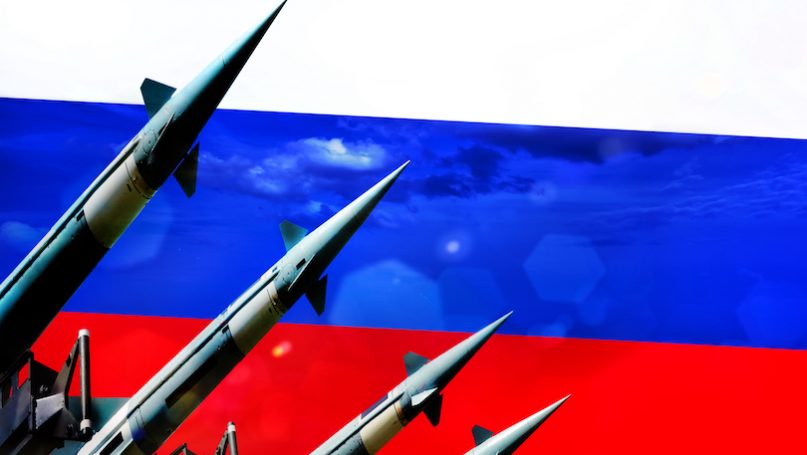
By launching a full invasion of Ukraine, Russia has overstepped a boundary. Vladimir Putin has made a decision from which no safe, obvious route leads back in a face-saving manner. For Putin, it is in all likelihood inconceivable to withdraw from Ukraine without any gain. This would undermine not only Russia’s status as a great power, to which he is greatly attached, but also Putin’s rule at home. In this situation, Putin may well perceive it as rational to make a clear sign of his and Russian strength. There is no doubt that he has the means at his disposal for making such a sign: nuclear weapons, which could be used at first in a tactical, substrategic manner.
Putin and Russia have already overstepped one boundary. They have already now vastly increased their reputation as pariahs of international society, at least from a Western perspective. Despite the fact that his war preparations have been made obvious by intelligence reports, Putin’s decision to wage war against Ukraine has surprised many. We cannot allow ourselves to be surprised another time by his recklessness. We must prepare ourselves for the risk of nuclear war. Everything that has happened in the past days, weeks, and months must lead us to conclude that nuclear war is a real possibility.
This brings about the question what we can do to avoid this possibility, a result much more terrible than what we have seen happen until now. That Putin should not choose this option is, from a normative and legal standpoint, obvious. That it would be a war crime if he does choose it is equally obvious. But it seems that, if he feels sufficiently threatened, trapped like a bear with no apparent way out, all the sanctions in the world cannot and will not stop him. What is required is some wisdom on our part with respect to how we behave.
There are three factors we can bet on if we wish to avoid nuclear war. The first factor is Western retaliation. Betting on this factor means to place our hope on Putin’s calculation that using nuclear weapons would overstep a boundary that puts him into greater risk than before. But Putin has demonstrated already that he is ready to accept very serious risks in order to pursue his project of reviving Great Russia and undoing the “geopolitical disaster” of the dissolution of the Eastern bloc. We cannot be sure that our capacity to retaliate will prevent Putin from using tactical nuclear weapons. And once tactical weapons are used, the next boundary – use of strategic nuclear weapons – is one step closer.
The second factor is resistance in Russia. There may be rational people in the Russian army who will decide not to execute a possible order by Putin to use nuclear weapons. There may be people in the Russian government who will perceive that their boss is on the way to run amok, and who will find means to stop him. While this is a real possibility, it is a factor that lies beyond our influence. Betting on this factor is like hoping that things will turn out for the better no matter what we do.
The third factor is the Western attempt to deescalate the conflict. Betting on this factor means serious reflection about how to reassure Putin and Russia, and open for them a way to get out of the war they have started in a face-saving manner. This reflection might mean that we must get ready to accept really quite terrible things. It might mean that we should not try to support Ukraine with as many weapons and sanctions as we can. It might even mean that, despite all our moral sympathies, we should be ready to sacrifice Ukraine. The Ukraine dominated by Russia, with its political elites driven out, its citizens persecuted, migrants leaving towards the West, would be a terribly sad and tragic outcome of this conflict. But it would be a far lesser evil than nuclear war.
There is understandable sympathy for the Ukrainian struggle today in the West. But this sympathy, and the emotions of war, must not blind us for the dangers inherent in the situation. Today, it is not Milosevic’s Serbia that suppresses Kosovars, but Putin’s Russia that has attacked Ukraine. In other words, it is a state in possession of over 6,000 nuclear weapons – making it capable of destroying most human life on this planet. Taking this situation seriously means that we must deploy all our political wisdom and show a capacity for serious judgement. Given the increased use of war rhetoric (including calls for a no-fly-zone over Ukraine), and the absence of a de-escalating, re-assuring strategy, it is unclear whether Western decision-makers today are in possession of this capacity.
Further Reading on E-International Relations
- Opinion – On 9 May Putin’s Russia Will Glorify War and Stalin
- Opinion – A Psychological Perspective on Putin’s War with Ukraine
- Opinion – A Hidden Victory? The Winter War and Russia’s Invasion of Ukraine
- Ignore the Paradox: Russia, Ukraine, and Nuclear Deterrence
- Opinion – Russian Motives in Ukraine and Western Response Options
- Opinion – The West’s Mental Lockdown over Putin’s Invasion of Ukraine